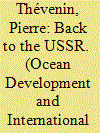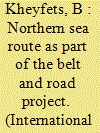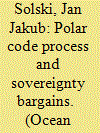| Srl | Item |
| 1 |
ID:
191902


|
|
|
|
|
| Summary/Abstract |
This article analyzes the consequences of the recently declassified Soviet decree No. 331-112 of 27 April 1965 that established, inter alia, the status of the Soviet Arctic straits along the Northern Sea Route with respect to warships’ right of innocent passage. This article argues that the decree, read in conjunction with Article 5.2 of the 1958 Convention on the Territorial Sea and Contiguous Zone and Article 8.2 of the United Nations Convention on the Law of the Sea, establishes a right of innocent passage through the majority of the Russian Arctic straits, which warships can enjoy. Furthermore, this article asserts that the decree calls into question the existence of a customary regime regulating navigation through the Arctic straits.
|
|
|
|
|
|
|
|
|
|
|
|
|
|
|
|
| 2 |
ID:
162809


|
|
|
|
|
| Summary/Abstract |
The Northern Sea Route (NSR) may become a significant Russian contribution to China's One Belt, One Road project due to the shared interests of Russia and China. Russia definitely needs the NSR much more than any of the potential other participants in Belt and Road. The NSR plays a key role in the development of vast Russian territories that are largely uninhabited but possess tremendous reserves of timber, gas, oil and various other minerals and extensive sea areas with large fish resources. According to some estimates, the NSR connects areas that make up nearly 70% of Russia's territory.1 The NSR also has national security significance that is hard to overestimate. All this makes the NSR a strategic asset for Russia.
|
|
|
|
|
|
|
|
|
|
|
|
|
|
|
|
| 3 |
ID:
190648


|
|
|
|
|
| Summary/Abstract |
Owing to a shift from the culture of compliance to the culture of benchmarking, the Polar Code process of ensuring safe operation and environmental protection in Polar waters is still ongoing. The risk and goal-based approaches embedded in significant parts of the Polar Code invite different stakeholders to participate in the development of Arctic shipping governance. The methodology used in the process, such as POLARIS, may serve as a common baseline, but its utility relies on further updates and validation. The reliability of decision-support systems depends largely on whether different stakeholders embrace the system and share their experiences to facilitate systematic updates. This article compares the approaches of the two major coastal states, Canada and Russia, to POLARIS as reflected in their coastal state systems of shipping control in the Canadian Arctic Waters and the Russian Northern Sea Route (NSR). Considering that much Arctic shipping occurs within the Canadian Arctic and the NSR, their regulatory approaches may affect POLARIS’s popularity, acceptance, and, eventually, success in providing a common regulatory baseline.
|
|
|
|
|
|
|
|
|
|
|
|
|
|
|
|